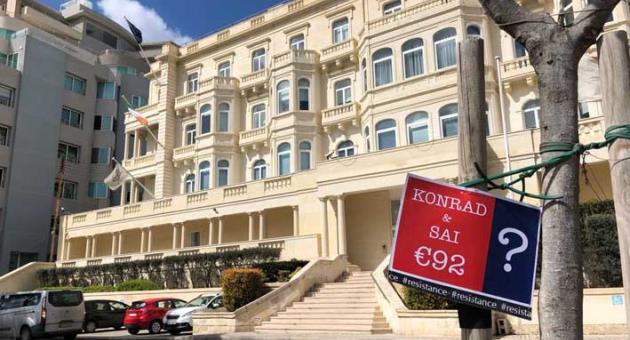
In this third article in this series (which starts here), I am writing on some of the key points highlighted in the fourth six-monthly report of the Competent Person, together with my observations. This report was addressed to the Parliamentary Secretary for Financial Services and Digital Economy, on 12 May 2020.
I must immediately highlight that the report is, in many respects, a ‘cut and paste’ of the previous reports, which reveals very little that is new. In fact, I must immediately question whether the taxpayer is, directly or indirectly, throwing good money after bad, in retaining a surely expensive competent person, without seeing any tangible results on the operational history of a bank, which clearly operated as a money laundering machine for the family of the President of Azerbaijan and other political exposed persons from Azerbaijan and other suspect countries, besides politically exposed persons in Malta like Keith Schembri.
The Competent Person reports under the heading of ‘key events’ that:
- During the period, attention was focused on reactivation of the Bank’s IT system and updating of the Bank’s financial records. The reactivation started in September when staff of the Bank were granted access to the system’s passwords. This access could not be made until the end of September, because contracts with the IT service providers had to be reinstated.
- During the period under review, he continued to exchange correspondence with the legal advisors representing a borrowing customer that wished to repay its loan prior to maturity on 18 August 2018, that is 22 months ago. To-date, the authority of the MFSA for such early (!) repayment has not been issued, and therefore the matter is still unresolved, and the relevant loan has not yet been settled.
- During the month of October2019, the bank staff continued to process vendor invoices, and by the end of October, the entries for 2018 were completed. This enabled the commencement of discussions with the Bank’s auditors, KPMG, to start planning the audit of the financial records for the year ended 31 December 2018.
- The Banks’s payroll and Tax processor resigned during December for reputation risk concerns.
- During December, the bank experienced trouble clearing Bank payments with certain international clearing banks, and this required the employment of inefficient workarounds to solve the problems.
- Also, during December, the bank had to pay a fine of Euro 10,000 to the FIAU for the Bank’s failure to reply to two requests for information from the FIAU in January 2017.
- The bank’s statement of financial position as at 29 February 2020remained practically the same as that at 31 August 2019, except for a loss for the period of €252,622.
Observations
- My first observation is one of great concern on the long delay taken in allowing access to the Bank premises, to the hard copy records, and even more to the IT system and soft records, and passwords, which were being kept at the Courts. This situation, in an environment of potential money laundering activities involving Politically Exposed Persons in Malta and Azerbaijan, the high risk money laundering jurisdiction of Azerbaijan, and the destination of funds to and from the highly secretive jurisdiction of Dubai, highlights the possibility that space may have been created for the manipulation of hard data and electronic data/IT systems, both at the Bank premises and, but hopefully not, at the data depositary at the Courts while these same records were being used in the Egrant Inquiry.
- Another concern is the possible reason underlying the request for an early closure of a loan given to one of the customers, which is still pending 22 months after the maturity of the term of the loan. One possible reason could be that the loan was a cover up for a money laundering transaction and the loan holder wished to close the loan to cover any trace of the transaction and possible incrimination. Details like nationality of the borrower, the amount borrowed and whether the borrower is a politically exposed person, should be included in the next report, in the interest of Parliament and the general public.
- The competent person should include in his report, statistics about the number of customers released and the total value released, the number of suspicious transaction reports filed with the FIAU together with the total transaction value, and the total transaction values (inwards and outwards) channeled through the bank, for the period from its operative date to 31 December 2018, the financial year end which is being subject to audit. This type of information has already been given by the competent person of Satabank, in his report to Parliament.
Conclusion
I hope that the competent person has already formally recommended to the competent authorities to initiate an international investigation into the operations of Pilatus Bank and to the possible wrongful trading by the directors and senior management. A similar request/recommendation has already been made by the court appointed experts of the Egrant inquiry.
In my opinion, Parliament is being irresponsible. They are not debating the reports submitted by the competent person and I think this is a blatant failure that raises the question on why there is the legal requirement to table such reports on a regular basis. Surely not to have them gather dust in the archives of Parliament.